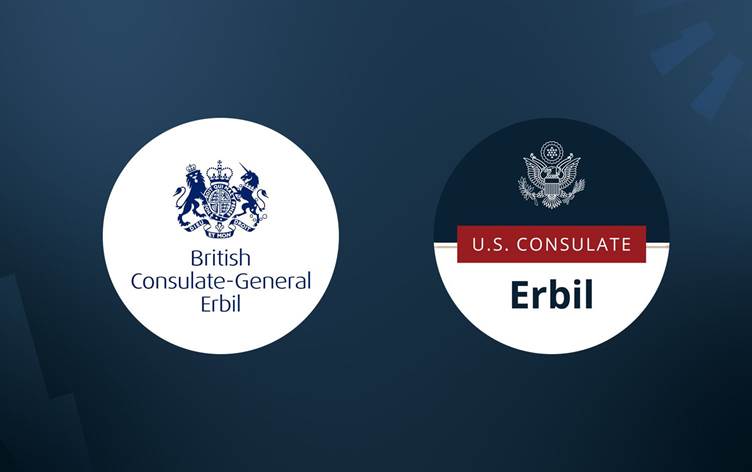
Logos of the UK Consulate in Erbil (left) and the US Consulate in Erbil (right). Graphic: Rudaw
ERBIL, Kurdistan Region - The United Kingdom on Saturday welcomed a decision from the Kurdistan Regional Government (KRG) to cancel a 2023 media directive that introduced security vetting requirements for online journalists. The United States welcomed the decision a day earlier.
In May, the KRG Ministry of Culture passed media directive No. 1, 2023, that would have acted as a criterion, along with the Region's journalism law, copyright law, and other general provisions to decide on journalism cases in the courts. It was quickly slammed by press freedom advocates for the ambiguity of its language and for limiting freedom of speech and journalism.
On Friday, KRG Cabinet Secretary Amanj Rahim announced on his Facebook page that the Ministry of Culture had cancelled the directive and the decision was made official when it was published in the Kurdistan Region’s official gazette in late January.
Namiq Hawrami, spokesperson for the Culture Ministry, on Friday told Rudaw that the ministry "issued the directive to regulate the work of the media, but when we saw that the directive caused concern, we decided to stop it.”
"The concern was due to it not being well understood," he added.
The UK consulate in Erbil on Saturday welcomed the cancellation of the directive in a statement published on X, saying that the new measures “would have made the work of journalists and media organizations harder, hindering their ability to freely report the news.”
“This is a positive step forwards and we commend the KRG for taking action to repeal this directive,” read the statement.
The US Consulate in Erbil also welcomed the decision that it said would have “chilled media freedom.”
“This decision to cancel the directive reflects the KRG’s responsiveness to concerns raised by the international community as well as local efforts to improve media freedoms,” stated the consulate, reiterating its commitment to work with “local and international partners to continue to improve and promote media freedom and responsible media.”
Less than a month ago, the US consulate in Erbil expressed concern about a “backsliding of press freedom” in the Kurdistan Region.
“The U.S. is concerned about the recent backsliding of press freedom in the IKR and is committed to working with local and international partners to improve the media landscape, including providing professional development opportunities for journalists,” the US consulate in Erbil said in a Facebook post on February 1.
The KRG has defended its record on press freedoms. Peshawa Hawramani, KRG spokesperson, said in a post on X later the same day that the U.S. expressed concern that there was “a 42 percent drop in the violations against journalists” in the Kurdistan Region in 2023 compared to the previous year, citing the latest figures published by a media watchdog.
“Additionally, during official meetings, the consulate has expressed its appreciation for the decline in the violations and thanked the government for this,” he added.
That was challenged by Rahman Ghaeeb, head of Metro Center for Journalists Rights and Advocacy, the media watchdog cited by Hawramani, who told Rudaw English that “no one can prove that the condition of press freedom in the Kurdistan Region is healthy and perfect as long as we have people [journalists] in jail.”
He noted that while it is true that their 2023 report showed a 42 percent decline in violations against journalists compared to the previous year, “obstruction of journalism has increased.”
On Thursday, Dindar Zebari, KRG’s coordinator for International Advocacy said on X that “in accordance with the annual report of the KRG action plan, press freedom has soared by 70%.”
Kurdish authorities repeatedly face harsh criticism for their treatment of journalists and for imposing restrictive measures on the press.
The Kurdistan Region’s authorities used “vaguely worded laws” to suppress dissent and target those who expressed divergent viewpoints, arresting dozens of activists and journalists along the way, Human Rights Watch (HRW) said in their annual report in January 2023.









Comments
Rudaw moderates all comments submitted on our website. We welcome comments which are relevant to the article and encourage further discussion about the issues that matter to you. We also welcome constructive criticism about Rudaw.
To be approved for publication, however, your comments must meet our community guidelines.
We will not tolerate the following: profanity, threats, personal attacks, vulgarity, abuse (such as sexism, racism, homophobia or xenophobia), or commercial or personal promotion.
Comments that do not meet our guidelines will be rejected. Comments are not edited – they are either approved or rejected.
Post a comment